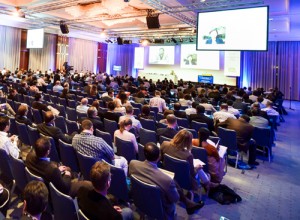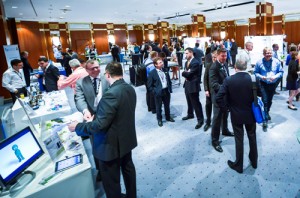
Podium presentation during RDD Europe 2013
Weeks after the conclusion of RDD Europe 2013 in Berlin, organizers RDD Online and Aptar Pharma are still wrapping up logistical loose ends and analyzing delegate feedback, says Pierre Carlotti of Aptar Pharma. OINDP specialists from 29 countries attended the meeting, with an increase in European delegates, especially from Southern and Eastern Europe, and a slight decrease in North Americans this year.
Although it will take a little time before organizers have the complete picture, Carlotti notes that it is already clear that “People were very happy with the meeting.” The initial analysis of evaluation forms filled out at the end of the conference, either on the spot or online, confirms the impression the organizers had while the conference was underway, he says: “We could feel the atmosphere, and it was very positive.”
Some of RDD Europe’s new features, such as better electronic access to proceedings and more time for the technology and poster sessions, came about as the result of suggestions from earlier meetings, and delegates recognized the effort, Carlotti says. “In 2011, we got feedback about easier access to proceedings and other information, and last year in the US, RDD came up with the electronic platform that we implemented in Berlin this year. People really appreciated it and thanked us for it.”

The technology and poster exhibit at RDD Europe 2013
First tested at RDD in 2012, the electronic information system for the conference included wi-fi access and a website optimized for fast downloads of the conference schedule, abstracts, and a list of delegates that was available throughout the three-day meeting. Delegates appeared to make extensive use of the system to access the conference proceedings.
As early as 2009, delegates began asking organizers to extend the technology and poster sessions through the final morning of the meeting; the 2013 meeting offered the first opportunity to implement the change. Carlotti partially credits the extended technology and poster session, along with strong programming of the podium sessions, for surprisingly heavy attendance on Friday morning. Despite the fact that most of the delegates had stayed at the Berlin Tipi, site of the gala dinner, until at least midnight — and more than 50 were still dancing at 1:30 a.m. — the auditorium was full for the morning’s first presentation.
The meeting’s variety of programming formats also was very well received, with good attendance at the workshops. A number of delegates indicated that they enjoyed the break from podium sessions and the opportunity to select presentations geared toward their specific interests, according to Carlotti, and the organizers may consider adding even more options for future RDD Europes, perhaps with programming offered in parallel with the workshops.
“Even though the meeting has gotten bigger over the years, it’s still the perfect size for networking,” Carlotti points out, “and we know that more and more side meetings are being held, which is a very positive aspect of this conference.” It’s possible, he says, that more options may be added to the programming in order to facilitate these sorts of interactions; “we really need to analyze what the delegates are telling us and work from there.”
One format change for RDD Europe 2015 in Nice, France has already been finalized. For the first time, the meeting will take place outside of a hotel, at a new convention center designed specifically for meetings of about 500 people. “It’s really the perfect size for the event,” Carlotti says, “and we will have all the benefits of a conference center without losing everything that you get from having everything under one roof.”


